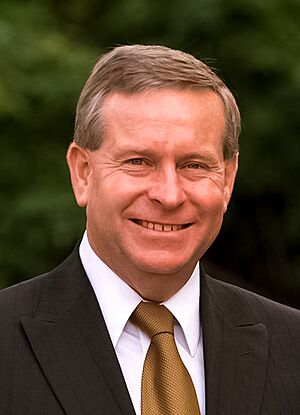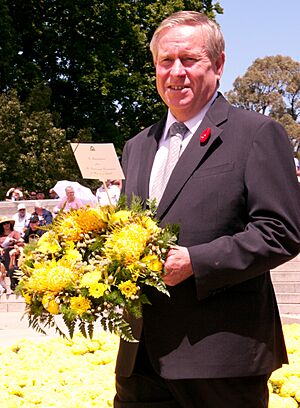Colin Barnett facts for kids
Quick facts for kids
Colin Barnett
|
|
|---|---|
 |
|
| 29th Premier of Western Australia | |
| In office 23 September 2008 – 17 March 2017 |
|
| Monarch | Elizabeth II |
| Governor | Ken Michael Malcolm McCusker Kerry Sanderson |
| Deputy | Kim Hames Liza Harvey |
| Preceded by | Alan Carpenter |
| Succeeded by | Mark McGowan |
| Treasurer of Western Australia | |
| In office 27 April 2010 – 14 December 2010 |
|
| Preceded by | Troy Buswell |
| Succeeded by | Christian Porter |
| In office 12 June 2012 – 7 July 2012 |
|
| Preceded by | Christian Porter |
| Succeeded by | Troy Buswell |
| In office 10 March 2014 – 17 March 2014 |
|
| Preceded by | Troy Buswell |
| Succeeded by | Mike Nahan |
| 27th Leader of the Opposition in Western Australia Elections: 2005 |
|
| In office 26 February 2001 – 9 March 2005 |
|
| Deputy | Dan Sullivan |
| Preceded by | Richard Court |
| Succeeded by | Matt Birney |
| In office 6 August 2008 – 23 September 2008 |
|
| Deputy | Kim Hames |
| Preceded by | Troy Buswell |
| Succeeded by | Eric Ripper |
| In office 17 March 2017 – 21 March 2017 |
|
| Deputy | Liza Harvey |
| Preceded by | Mark McGowan |
| Succeeded by | Mike Nahan |
| Member of the Western Australian Parliament for Cottesloe |
|
| In office 11 August 1990 – 5 February 2018 |
|
| Preceded by | Bill Hassell |
| Succeeded by | David Honey |
| Personal details | |
| Born |
Colin James Barnett
15 July 1950 Nedlands, Western Australia, Australia |
| Political party | Liberal Party |
| Alma mater | University of Western Australia |
| Profession | Economist |
Colin James Barnett (born 15 July 1950) is an Australian former politician. He was the 29th Premier of Western Australia. The Premier is the leader of the state government. He also served as the state's Treasurer at different times.
Barnett was born in Nedlands, a suburb of Perth. He studied economics at the University of Western Australia. Before politics, he taught economics and worked for a business group. In 1990, he was elected to the Western Australian Legislative Assembly. This is like the state parliament.
He served as a minister in the government from 1993 to 2001. After his party lost the election in 2001, he became the leader of the Liberal Party. He stepped down as leader in 2005 but became leader again in 2008. He then led his party to win the election and became Premier. He was sworn into office on 23 September 2008. In 2013, he was re-elected for a second term.
In 2017, his party lost the election. Mark McGowan became the new Premier. Colin Barnett announced he would leave politics in December 2017. He officially retired on 5 February 2018.
Contents
Early Life and Career
Colin Barnett was born in Nedlands, Perth, on 15 July 1950. He went to Nedlands Primary School and Hollywood Senior High School. He first studied geology at the University of Western Australia. Later, he changed to economics and earned a master's degree.
In 1973, he worked for the Australian Bureau of Statistics. He returned to Perth in 1975. He became an economics lecturer at the Western Australian Institute of Technology. This university is now known as Curtin University.
In the 1980s, he worked for business organizations. He was the chief economist for the Confederation of Western Australian Industry. Then, he became the executive director of the Western Australian Chamber of Commerce and Industry.
Starting in Politics
In 1990, Colin Barnett entered state politics. He won a special election for the seat of Cottesloe. He joined the Liberal Party during the election process.
Soon after joining parliament, he became part of the shadow cabinet. This is a group of opposition politicians who watch over government ministers. He was responsible for housing, works, and fuel and energy. In 1992, he became the deputy leader of the Liberal Party.
Serving in Government (1993–2001)
After the 1993 state election, the Liberal Party won. Colin Barnett became a minister in the government. He was Minister for Resources Development and Energy. Later, he became Minister for Education and Minister for Tourism. He was also the Leader of the House in the Legislative Assembly. This role helps manage the parliament's business.
He was seen as a good minister. He helped with important projects that developed Western Australia's natural resources.
In Opposition (2001–2008)
The government lost the 2001 election. Colin Barnett then became the leader of the opposition. This meant he was the main leader of the party not in power.
In the 2005 state election, Barnett suggested building a canal. This canal would bring water from the Kimberley Ranges in northern Western Australia to Perth. This was to help with Perth's water supply. The idea was very expensive, and some experts thought it would cost much more than first estimated.
After his party lost the 2005 election, Barnett took responsibility. He resigned as the Liberal leader. He then spent two years as a regular member of parliament. In 2007, he said he planned to retire from politics.
Becoming Premier (2008–2017)
In August 2008, the Liberal Party needed a new leader. Colin Barnett was chosen again, even though he had planned to retire. The Premier, Alan Carpenter, then called an early election.
The 2008 election resulted in a "hung parliament." This means no single party won enough seats to form a government on its own. The WA Nationals held the balance of power. After a week, the Nationals agreed to support the Liberal Party. This allowed Colin Barnett to form a minority government. He became Premier on 23 September 2008.
Barnett was the only state premier who disagreed with a major health reform plan in 2010. This plan would have changed how money for hospitals was shared. He believed it would unfairly affect Western Australia's finances. He argued that Western Australia needed its full share of money to fund important projects.
From April to December 2010, Barnett also served as the state's Treasurer. He took on this role again for short periods in 2012 and 2014.
In the 2013 state election, Barnett led the Liberals to a big victory. His party won enough seats to govern on its own. However, he decided to keep the coalition with the WA Nationals. This was partly because of how seats are divided in the state's upper house, the Legislative Council.
Key Policies and Challenges
During his time as Premier, Colin Barnett introduced several policies. These included changes to drug laws. He also supported a plan to manage shark populations near the coast.
In 2013, he stated that Western Australia would not join the Gonski School Funding Reforms. He believed that the state government should manage its own schools.
In 2015, he spoke about how mining money was used. He said it was spent on important social needs like disability support and mental health. He also expressed that the Liberal Party should be more open-minded on social issues.
Leadership Challenges and Election Defeat
In September 2016, some ministers resigned from his cabinet. A vote was held to challenge his leadership of the Liberal Party. However, the motion to remove him as leader was defeated.
Leading up to the 2017 election, polls showed his government was not very popular. On 11 March 2017, Barnett's government suffered a large defeat. The Liberal Party lost many seats, especially in Perth. Seven of his cabinet members lost their seats.
After the defeat, Colin Barnett resigned as Liberal leader. He returned to being a regular member of parliament. Mike Nahan became the new WA Liberal leader.
On 15 December 2017, Barnett announced his plan to retire from politics. He officially left parliament on 5 February 2018.
Honours and Recognition
In 2023, Colin Barnett received a high honour. He was appointed as a Companion of the Order of Australia. This award recognized his important service to Western Australia. It highlighted his work as Premier, his efforts in economic and infrastructure development, social welfare reform, and his contributions to the Indigenous community.
See also
- Barnett Ministry
 | Kyle Baker |
 | Joseph Yoakum |
 | Laura Wheeler Waring |
 | Henry Ossawa Tanner |


